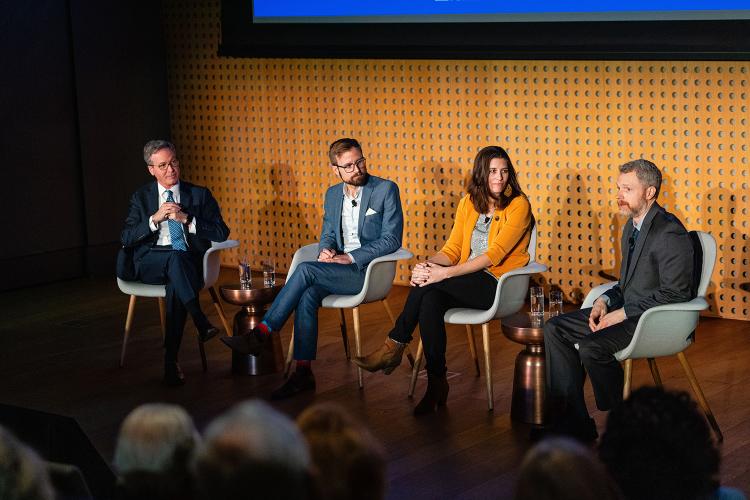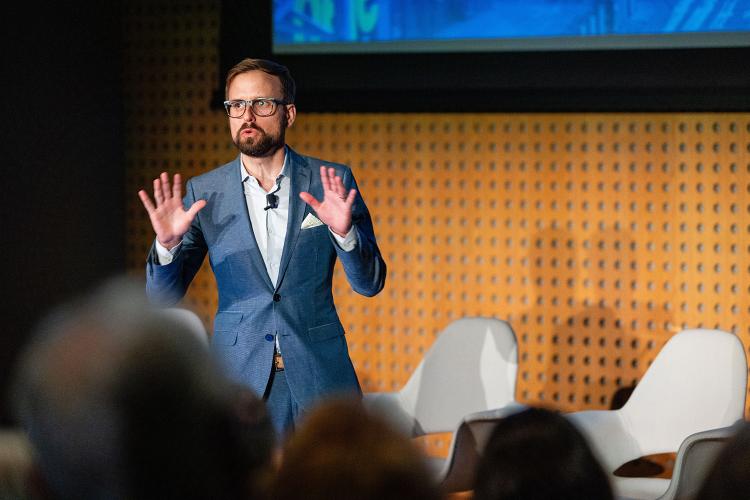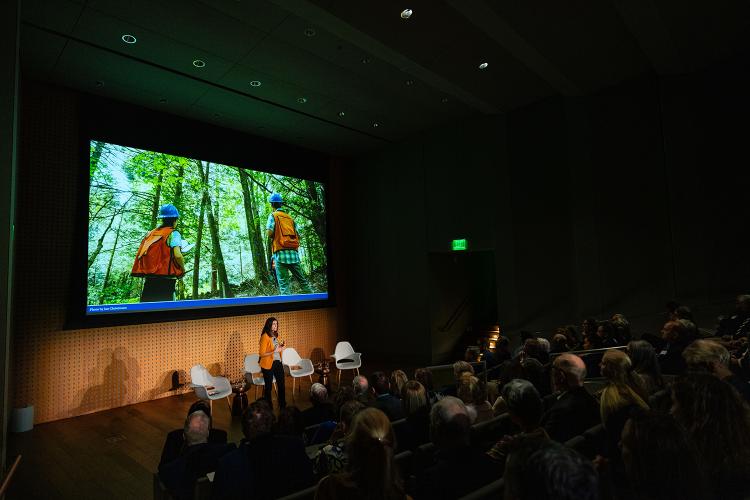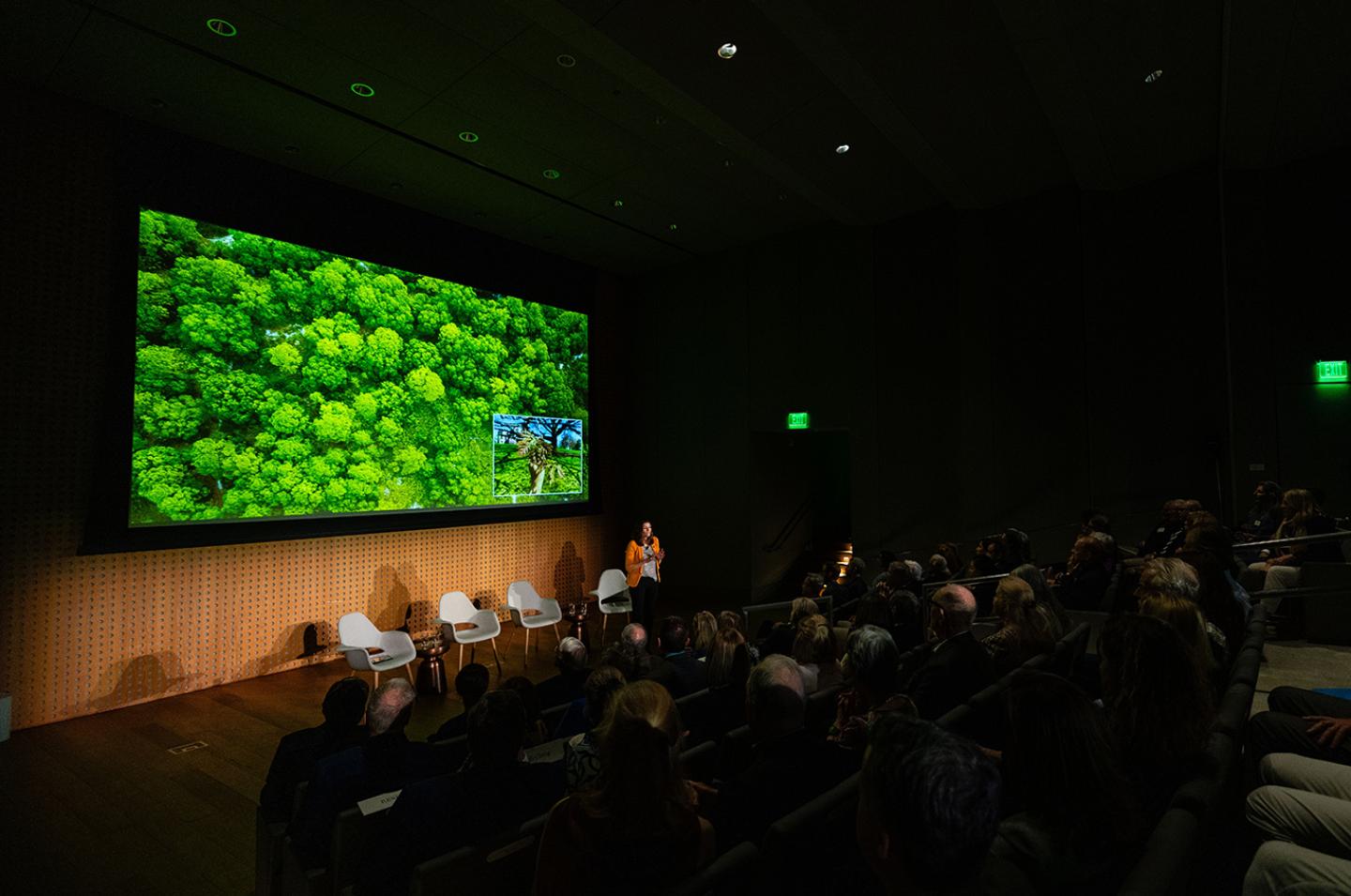Can we avoid the most catastrophic impacts of climate change? What roles can new technologies (or old forests) play in doing so? And is there any good news from the front lines of climate research? At the most recent For Humanity Illuminated event on February 7, these were some of the questions that Yale researchers answered in front of a crowd of 200 members of the Yale community, who gathered at the Norton Museum of Art in West Palm Beach, Florida.
The event featured prominent experts on climate change and air pollution. They spoke about the urgent need to mobilize an effort to combat climate change, keeping the world from crossing the critical threshold of two degrees Celsius warmer than the pre-industrial average. Their promising research and that of their colleagues could lead the way toward a cooler world.

A Complex Problem
Drew Gentner, associate professor of chemical and environmental engineering, started off the evening with some good news: urban air quality has improved markedly in recent decades. “The increasing frequency of clear skyline views and distant mountains are poignant reminders of our progress and capacity to tackle challenging environmental problems,” he said. These successes have come thanks to regulations and policies as well as technological advancements.

But Gentner’s research has shown that, as days get hotter due to climate change, urban air pollution gets worse. “Future policy-related gains in urban air quality risk being offset by increased emissions in a warming climate,” he said. Even with reduced automobile emissions from widespread vehicle electrification, a warming climate may exacerbate air quality issues from other sources.
He also emphasized the importance of including and mentoring emerging scientists in his research: Yale undergraduates have analyzed data and helped launch NASA weather balloons from the Yale Coastal Field Station in Guilford, CT. “Undergraduate education cannot stop when we exit the classroom,” he said. “Yale has a critical role to play—not just in understanding and addressing climate change and its impacts but in preparing the next generation of scientists, engineers, and innovators as the leaders of our shared future.”
Matthew Eisaman, associate professor in the Department of Earth and Planetary Sciences and the Yale Center for Natural Carbon Capture, brought climate change home to the Palm Beach crowd by showing a digital rendering of Rosemary Square, just a fifteen-minute walk from where the event was taking place. Even if we manage to stabilize the global temperature increase at 1.5 degrees Celsius above pre-industrial levels, he explained, the square would be somewhat flooded. At two degrees, renderings show water covering almost all of the square.
“The point here is that every degree, every tenth of a degree of warming matters in terms of minimizing how many of our cities, towns, and homes become uninhabitable in the future,” said Eisaman. His research has focused on how to use existing geochemical processes—such as how the ocean can naturally absorb carbon dioxide over hundreds of thousands of years—and speed them up to a human timescale. “This work is being catalyzed and accelerated by the recent formation of the Yale Center for Natural Carbon Capture,” he said. “This center is bringing together researchers from across multiple departments at Yale to fill critical knowledge gaps in our understanding of carbon dioxide removal and translate this knowledge into real-world impact.”
Sara Kuebbing, a research scientist at the Yale School of the Environment (YSE) and the director of research of the Yale Applied Science Synthesis Program, also wants to take advantage of existing natural processes to fight climate change: forests. “Forests are literally living carbon capture machines and storage facilities,” she said. “The trees found in forests have perfected photosynthetic technology through over 400 million years of evolution.”
In the southeastern US, Kuebbing said, pine forests could be replanted and store over a billion tons of carbon dioxide. And by deploying forest management practices like those used on Yale’s forested lands, millions more tons of carbon dioxide could be stored in existing forests. “At the Applied Science Synthesis Program, we connect academic researchers, policymakers, and the people who are managing our forests and other ecosystems with the data they need to make informed decisions,” Kuebbing said.

Finding Optimism
During a discussion with moderator Anthony Leiserowitz, founder and director of the Yale Program on Climate Change Communication and a senior research scientist at YSE, the researchers were asked whether they were optimistic about the possibility of keeping the Earth below the two degree Celsius threshold.
“We need a World War II-style mobilization effort,” Eisaman said. Kuebbing said she was “optimistic but cynical,” fearing that it will take large-scale climate disasters to finally motivate us, rather than taking thoughtful, planned, and proactive steps. But Gentner pointed out that we’ve made such drastic, rapid shifts in the past, including removing lead from gasoline and limiting the use of the chemicals that caused the hole in the ozone layer to form. “We’ve tackled big environmental problems before,” he said.
President Peter Salovey ’86 PhD noted that solving the climate crisis will require many different solutions and broad collaborations. “One of Yale’s greatest strengths is that we are a tight-knit community as well as a large global research university,” he said. “By nurturing productive connections across disciplines, the Planetary Solutions Project, with which our speakers tonight are affiliated, aims to solve complex environmental challenges at the pace they demand of us.”
Next: Dallas/Fort Worth
For Humanity Illuminated travels to Dallas/Fort Worth, TX, on April 30. Visit the For Humanity Illuminated page to stay up to date on upcoming events and watch recordings of past programs.
